Articles from this issue
- Our 75th Anniversary: A time to look forward to as well as back
- Student employability: Whose job is it?
- Meetings Report
- 75th Anniversary: The best is yet to come
Volumes
Issues
VOLUME 4 - ISSUE 1 - 75TH ANNIVERSARY: THE BEST IS YET TO COME
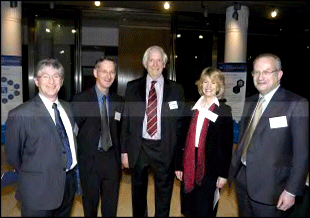 |
On 19 January we launched our celebrations of 75 years of the BPS in London in the company of Lord Sainsbury, Minister for Science and Innovation, and a host of invited guests from government, industry, academia and other societies.The Royal Society of Medicine provided an elegant venue, and Julia Bucking-ham, Patrick Vallance, Ray Hill and the Minister spoke eloquently about the history of pharmacology and the Society, challenges for the discipline in the future, and the Government’s role in supporting science. Julia Buckingham, outgoing President, summarized the Society’s history, reminding us of the eminent pharmacologists such as Henry Dale, John Vane and James Black, who have played |
(and in the latter case, continue to play) such a major role both in the discovery and development of drugs and in the life of the Society. She described the Society’s mission as being “to promote and advance pharmacology and to enhance the training of future generations of pharmacologists”.
She also spoke about what makes pharmacology such an attractive, even unique discipline: “Pharmacology underpins the development and safe usage of medicines. It is a hybrid discipline which uses chemical, biochemical, mathematical, molecular, cellular and physiological techniques to provide new insight to drug targets and to drug actions and their quantification. Pharmacology in fact is unique amongst the biosciences in that it is present throughout the drug life cycle from the earliest stages of discovery, to refinement and testing and ultimately to the monitoring and overseeing of drugs in clinical use in the human and animal population. Its essential role in translational research gives it the added bonus of drawing basic and clinical scientists together.”
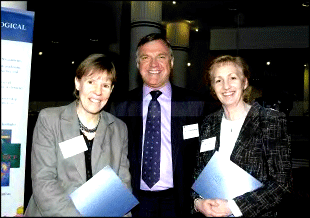 |
After receiving his certificate of Honorary Fellowship, Lord Sainsbury spoke about his pleasure in holding the post of Minister for Science and Innovation, “the best job in government”. His reasons for thinking this were two fold - first, the UK’s position as one of the countries with the best records of scientific discovery and second, that with the strong backing of the Prime Minister and Chancellor of the Exchequer he had been able to increase funding for scientific and technological research. He stressed the increasing importance of science and technology in the economy as a result of scientific innovations and of globalization. He then went on to talk about two areas of particular significance to pharmacology, on which he was spending much of his time. |
The first was skills shortages. He reported encouraging increases in the number of young people taking science and technology degrees since the late 1990s, but recognized that skills gaps remained in certain key areas, including pharmacology, as noted by the recent report from the ABPI.
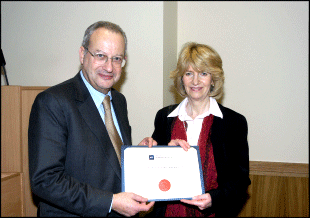 |
He also spoke about the Government’s determination to end the harassment of researchers by animal rights activists, and announced an increase in the police resources devoted to this problem. He concluded by saying: “MPs often point out to Ministers in the House of Lords that they have an easy life because they have no constituencies to look after. In return I point out that my constituency consists of all the scientists and engineers in the country, and that this dwarfs all their constituencies in size. I appreciate the honour you have bestowed on me this evening not least because it suggests to me that you are not yet looking for a new Member of Parliament.” |
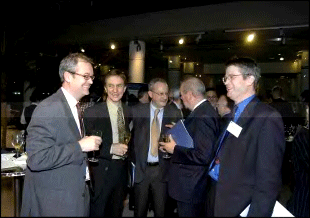 |
Patrick Vallance then spoke about academic pharmacology, choosing to be optimistic: “the best is yet to come”. He drew attention to the major improvements in treatments that pharmacology has brought in the last fifty years. It seems paradoxical then that in the UK, departments have been closed or merged, that numbers of practitioners have fallen and that teaching of pharmacology and clinical pharmacology to medical students has almost disappeared in some medical schools.He speculated about whether this was because pharmacology was no longer needed, superseded by molecular and genetic approaches and high throughput screening and increasing medical specialisms, but dismissed this idea. |
The new reductionist approaches to biology have not given us all the answers, and indeed have emphasized the need for scientists and doctors with expertise in integrative physiology and the skills “to tie it all together, to piece the epidemiology back to the chemistry, or to link the novel receptor to the therapeutic opportunity and keep the drug central to research.”
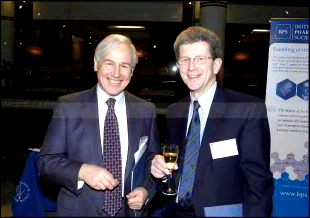 |
He concluded by touching on some of the challenges for the future, and a note of controversy for the Society: “There is no doubt that patients’ expectations of the quality of medical care are changing, and this includes their expectations of the quality of drug therapy: the risk of harm is becoming less and less acceptable, and a better benefit to harm balance is being demanded. And the right to prescribe from the whole formulary will extend from doctors to other practitioners, in the first instance nurses and pharmacists. These are all challenges for us as pharmacologists. So if the role of pharmacology brings with it a call for integration, and as we are the discipline that understands drugs, |
we have some questions to address. The most critical, I believe, is “Why are we as a Society split in two?”. I do not know where the boundaries of pharmacology and clinical pharmacology lie, and I think that if we are to justify the existence of a discipline based on drugs, we shall need to re-integrate ourselves...... I hope that that direction of travel continues, so that we can provide the leadership required to ensure that the best is indeed yet to come.”
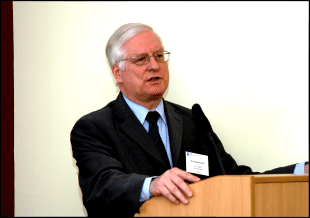 |
The last speaker was Ray Hill, who addressed the place of pharmacology in the pharmaceutical industry. He pointed out that the Industry was one of the most important sectors of British Industry and could lay claim to occupy the position held by shipbuilding 100 years ago, in the centre of the nation’s economy. Of the drugs used routinely in medical care in the UK, about half were discovered here. The Society’s close relationship with its members in industry has led to some ground breaking initiatives, such as the establishment of the Integrative Pharmacology Fund, with a total of £4 million in donations over four years from AstraZeneca, GlaxoSmith-Kline and Pfizer to develop capacity in in vivo research and training in the UK. |
The movement of pharmacologists between academia and industry benefited both: “There is no monopoly on good ideas, and that breakthrough concept is as likely to come from a University-based scientist as from a large team in industry”.
Ray claimed the privilege as the last speaker of looking to the future and speculating on what pharmacology might look like for the next 75 years: “The one thing that we can guarantee is that it will not be the way we think it will be and the skills of the pharmacologist in dealing with and interpreting an unexpected data set will still be needed!...... Perhaps the role of the BPS will be still more important then ...., as it may be that membership of the Society will then, even more than it does now, define a scientist (whatever his or her academic qualifications may be) as a Pharmacologist.”
The full texts of all the talks are on the Society’s web site.
